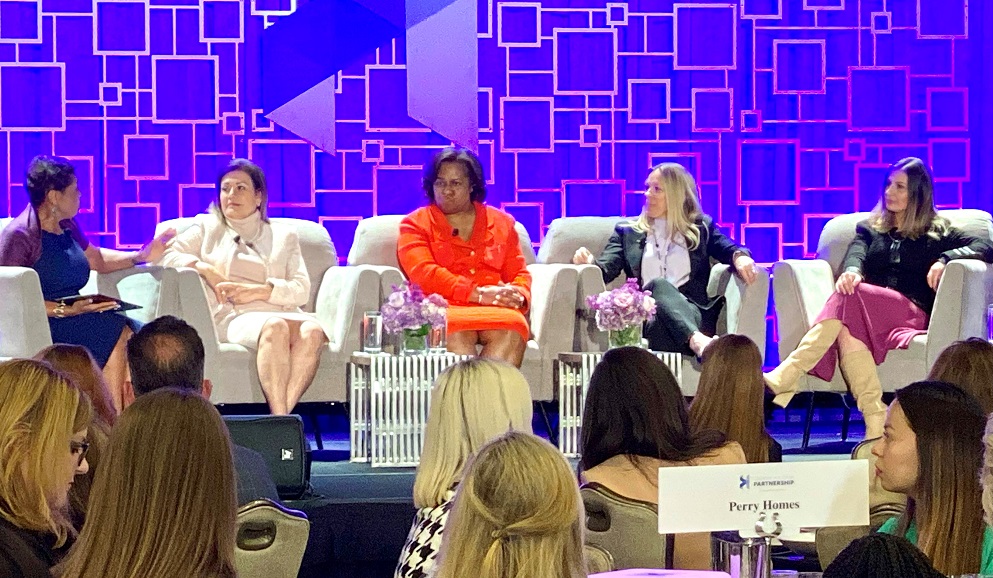Women Leaders Discuss Challenges, Mentorship, and Representation at Rise to the Top
Published Mar 10, 2022 by A.J. Mistretta
Female leaders from across greater Houston gathered this week for the Greater Houston Partnership’s 11th annual Rise to the Top event at the Marriott Marquis.
The sold-out celebration brought together high-achieving women from diverse industries to share insight and advice in recognition of International Women’s Day. Rise to the Top is the signature annual event of the Partnership’s Women’s Business Alliance.
"I challenge all of us today to reflect on our stories, listen for inspiration from our speakers, and use our voices to continue to forge stronger paths for women in the workplace,” said Katie Pryor, Chief Development Officer and SVP of Member Engagement at the Partnership.
Partnership President and CEO Bob Harvey said that while progress has certainly been made toward gender equity in the workplace, much work remains to be done in closing the gap of female representation, particularly in leadership. "Houston’s business community must work together to ensure we are fostering the growth of female leaders all the way to the top in our companies," Harvey said.
"Beyond International Women’s Day, it is up to us to advocate every day for the female leaders in our lives, pushing for our companies and communities to expand opportunities for female representation at the table," said Amy Chronis, Vice Chair and Managing Partner at Deloitte who also served as the Partnership’s 2021 Board Chair.
Linda Lorelle, Founder and CEO of Linda Lorelle Media and former KPRC-TV anchor, moderated a panel discussion featuring several guests.
- Irma Diaz-Gonzalez, President and CEO, Employment & Training Centers, Inc.
- Paula Harris, Executive Director, Astros Foundation
- Kimberly Krieger, Chief Operating Officer - Production, BPX Energy
- Nataly Marks, Managing Director & Region Manager, JPMorgan Chase & Co.
The panelists offered perspective and wisdom across a series of topics, from managing a work-life balance in the COVID-era and developing a strong workplace talent pipeline to encouraging young people to enter STEM careers. Here are just a few of the key takeaways.
“The biggest challenge to being a disruptor and becoming an equal is to first make people comfortable, and that takes persistence and patience, then you can add value to wherever you are.” – Paula Harris
“What helped me early in my career was knowing what I don’t know and building the trust with those who could teach me. I also learned how to be assertive and build a team.” – Kimberly Krieger
“I think we’re making a great deal of progress. We still, of course, have a long way to go—for every 100 male managers being promoted there are only about 80 women promoted. What we need is someone to pass the ball to us.” – Irma Diaz-Gonzalez
“Women are amazing and carry the world on our backs, but we often lack confidence. The best mentors have taught me that when you’re uncomfortable and unsure of something, just go for it.”– Nataly Marks
“I’ve found that one of the most satisfying moments for me is when I volunteer in public schools and tell my story. HISD is mostly minority students and when they hear from people who look like them, a story of hope and accomplishment, I think it can make a big difference.”– Irma Diaz-Gonzalez
“I believe that if you walk into an organization and find ways to add value, you’ll be successful.” – Paula Harris
“Challenge yourself about what you think you can’t have in your life and determine if that’s really true.” – Kimberly Krieger
Learn more about the Women's Business Alliance, and the Executive Women's Partnership. To learn more about membership with the Greater Houston Partnership click here, or contact membership@houston.org.
 The Houston Report
The Houston Report




















